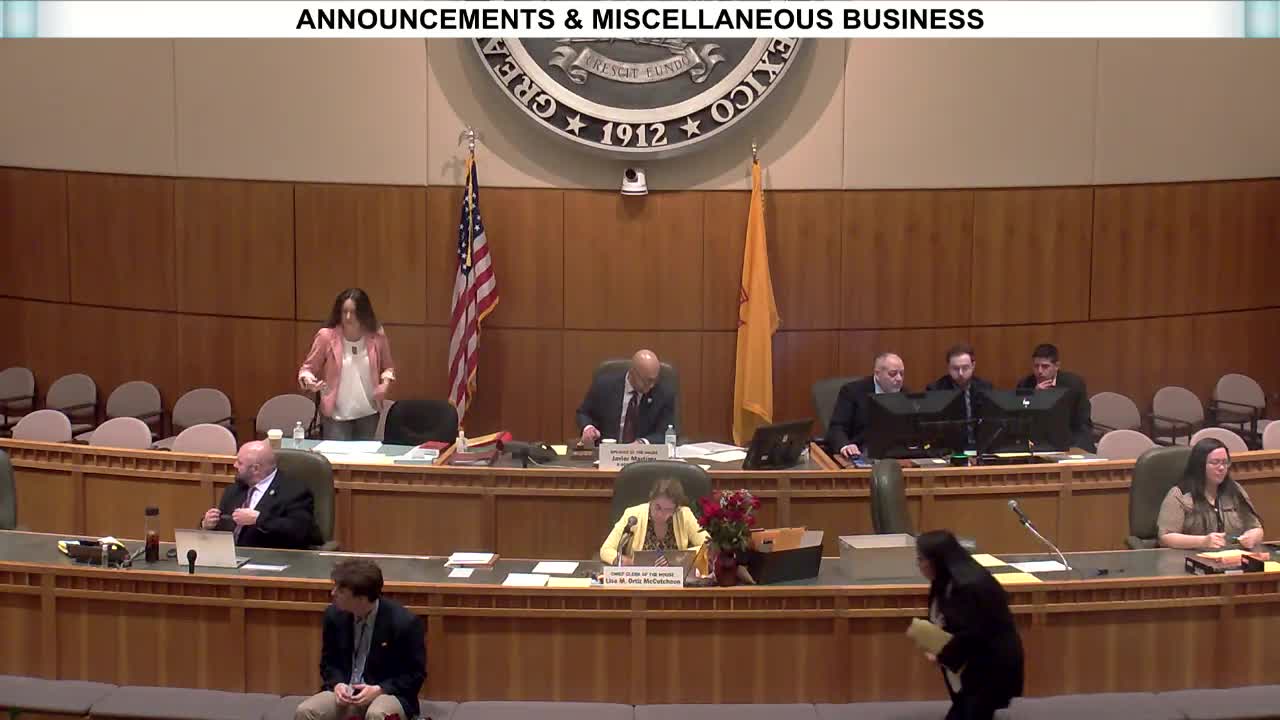House concurs with Senate changes to House Bill 8 after floor debate on weapons, DWI and competency rules
Get AI-powered insights, summaries, and transcripts
Subscribe
Summary
The New Mexico House voted to concur with Senate amendments to the House Judiciary Committee substitute for House Bill 8 after floor debate focused on the bill's definitions of firearm-conversion devices, limits on aggravated DWI for refusal of blood draws, competency proceedings and timelines for evaluations and restorations.
The House of Representatives voted to concur in Senate amendments to the House Judiciary Committee substitute for House Bill 8 after extended floor discussion about several substantive changes, including definitions for weapon-conversion devices, removal of an enhancement for refusing a blood draw in DWI cases, and timing and venue for competency proceedings.
The motion to concur was moved by Representative Chandler, who told members, "I support all of the amendments that have been proposed by the Senate," and explained most changes were technical while two were substantive: the removal of the weapon enhancement language and the striking of an enhancement for refusal of a blood draw in misdemeanor DWI cases.
Why it matters: HB8 packages multiple criminal-justice changes that lawmakers said clarify procedures used by courts and law enforcement and that affect how some offenses are charged and prosecuted. Lawmakers debated changes that alter courtroom venue for competency cases, set firm deadlines for reports and admissions for competency restoration and remove a criminal-enhancement tied to refusal to submit to a blood draw.
Key floor points
- Weapon definition: Members raised concerns about the Senate’s revised wording for the definition of a "fully automatic weapon." Representative Chatfield urged colleagues to "take a really close look to the definition of fully automatic weapon because depending on how you read it, it could be construed to meet most of our modern semi autos." Several members said the Senate replaced colloquial language with technical phrasing and wanted to ensure the new text matched federal and practical definitions.
- DWI blood-draw enhancement removed: As Chandler explained, the Senate struck a provision that would have allowed an aggravated charge when a person refused a blood draw following a misdemeanor DWI arrest. "They struck this entire section, which has the effect of eliminating the ability to aggravate a charge against an individual if they simply refuse to consent to a blood draw," Chandler said on the floor, and added senators expressed constitutional concerns about enhancing charges tied to invasive searches.
- Competency and venue changes: The Senate amendments move some competency proceedings to district court when competency questions arise outside district court; lawmakers said the change was intended to remove Metro Court’s continuing role in such proceedings. The Senate also replaced vague timing language with specific deadlines: for example, one provision sets a 90-day deadline for submission of an evaluation report in non-incarcerated cases where the original language used "within a reasonable time."
- Timelines for restoration and admissions: Floor discussion noted an earlier Judiciary Committee provision requiring the Department of Health to admit a defendant for competency restoration within 7 days was changed on the floor to 15 days after the Department indicated it needed more time. Chandler noted that a floor amendment changed the 7-day requirement to 15 days to provide the department additional time.
- Fentanyl sentencing language: The Senate struck language that had used a "whichever is less" formulation tying pill counts to powder-weight equivalents for enhancement thresholds in fentanyl offenses. As Chandler explained, the Senate concluded the removed language added confusion and that meeting either the pill-count threshold or the powder-weight threshold could be sufficient for enhancement consideration.
Procedure and outcome
Representative Chandler moved that the House concur with the Senate amendments to the House Judiciary Committee substitute for House Bill 8. After floor debate restricted to the senate amendments, the House voted by voice vote; the chair declared, "The ayes have it. The House has concurred with the Senate amendments to House Judiciary Committee substitute for House Bill 8, as 3 times amended." The concurrence was approved by voice vote; the transcript does not provide a roll-call tally for that motion.
What the House did not do: The House’s concurrence did not reinsert the DWI enhancement removed by the Senate; it accepted the Senate’s changes as presented. Several members asked for clarifying language and numbering to avoid confusion on the floor copies; one member requested corrected pagination for the printed amendment-in-context packet.
Next steps and outstanding questions
Because the House concurred, the bill returns to the enrolled process consistent with legislative procedure. Several members urged staff to ensure final printed versions and online copies reflect the exact amendment language to avoid confusion at later stages. Members who expressed technical concerns about the firearm definition said they would review federal definitions and the adopted text before the bill advances further.
